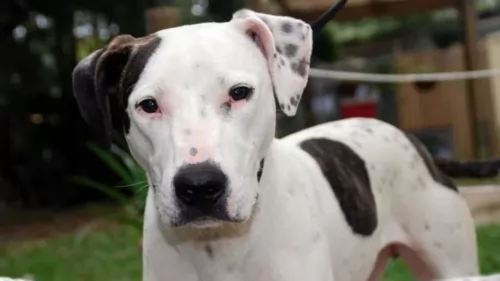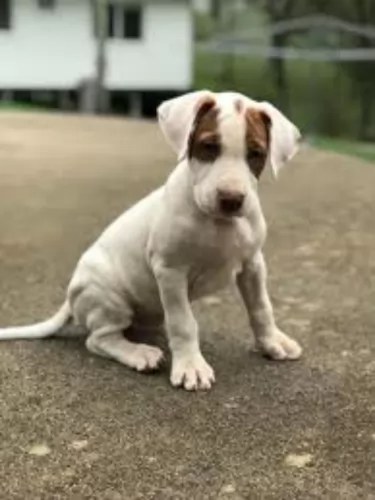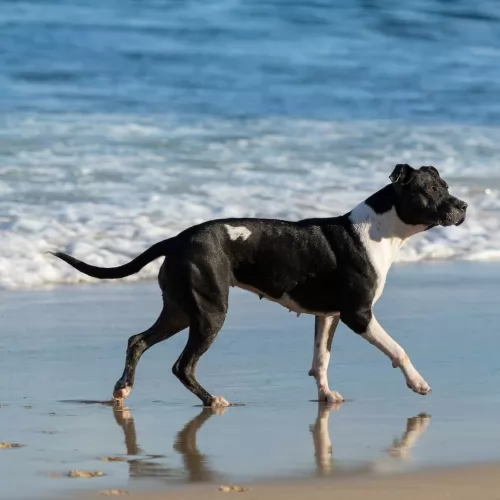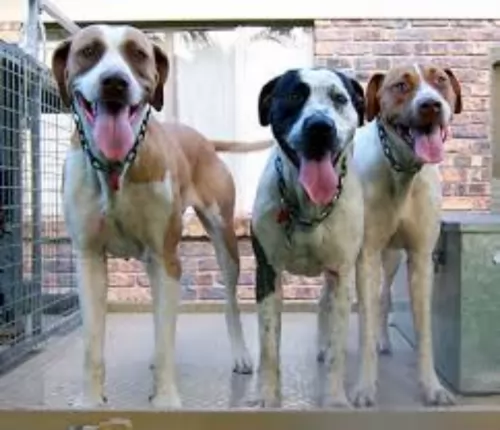 Petzlover
PetzloverCao de Fila da Terceira is originated from Portugal but Bull Arab is originated from Australia. Cao de Fila da Terceira may grow 12 cm / 4 inches shorter than Bull Arab. Cao de Fila da Terceira may weigh 30 kg / 67 pounds more than Bull Arab. Cao de Fila da Terceira may live 3 years less than Bull Arab. Both Cao de Fila da Terceira and Bull Arab has almost same litter size. Both Cao de Fila da Terceira and Bull Arab requires Low Maintenance.
The Cao de Fila da Terceira Mastiff hails from Portugal and is also known as the Rabo Torto.The dog actually comes from the isle of Terceira in the Azores. The dog descends from mastiffs, bulldogs and local dogs.
It was in the 1960s that there was an attempt to revive the dwindling numbers of the breed. The dog was declared extinct in the 1970s but there were some people in the Azores who wanted to see the breed restored, and it remains a mystery as to if the dog is in fact still available. The breed isn’t recognized by kennel clubs.
 In the 1970’s feral pig hunters wanted a dog that could be aggressive in finding and capturing the pigs. The hunters crossed the German Shorthaired Pointer, the Bull Terrier and the Greyhound to develop the Bull Arab. It is believed that the hybrid is at least 50% Bull Terrier. It is also possible that there is some Doberman, Mastiff, Great Dane and/or Pointer in the hybrid as well.
In the 1970’s feral pig hunters wanted a dog that could be aggressive in finding and capturing the pigs. The hunters crossed the German Shorthaired Pointer, the Bull Terrier and the Greyhound to develop the Bull Arab. It is believed that the hybrid is at least 50% Bull Terrier. It is also possible that there is some Doberman, Mastiff, Great Dane and/or Pointer in the hybrid as well.
The job of the Bull Arab is to hunt out the feral pigs, grab one by the ear and hold it until the hunter arrives. They have a strong sense of smell and that is how they find the pigs.
Mike Hodgens, an Australian, developed the hybrid and added some Bloodhound as well to get that ability to smell out the pigs at great distances. They are also capable of catching buffalo and cattle. Some Australians use the breed in cattle or buffalo ranching. They are registered with the DRA or Dog Registry of America, Inc.
The Cao de Fila da Terceira is a medium sized molosser, recognized by his weird tail – short and twirled. In fact, the dog’s other name, Rabo Torto, actually stands for ‘twisted tail’, which is a trademark of this dog and which is thought to come from the mix of bulldog in him.
The dog’s coat is short and smooth and the color is usually fawn or yellow while other colors such as brindle, red or black are also available but less acceptable. You may also find small white markings on the chest and feet.
Standing at about 55cm, the dog is muscular and powerful with a broad head, medium sized floppy ears, wide chest and strong muzzle.
The Cao de Fila da Terceira is a good guard dog and while he doesn’t like strangers, he is a dog who is loving and devoted with his human family. See that he gets socialized and trained and he is capable of establishing a deep relationship with all members of the family, children and other pets included. He relies on his owners to provide him with warmth and communication.
 Mike Hodgens succeeded in developing a powerful, well built dog. The Bull Arab has a powerful head and muzzle. He has moderate length drop ears and bright eyes that match the color of his coat. His chest is neither shallow nor deep and his back is straight and strong. Their tails are tapered and pointed yet the base is thick. They are a double-coated dog. They can be white with black, tan or liver, flecked or bicolor.
Mike Hodgens succeeded in developing a powerful, well built dog. The Bull Arab has a powerful head and muzzle. He has moderate length drop ears and bright eyes that match the color of his coat. His chest is neither shallow nor deep and his back is straight and strong. Their tails are tapered and pointed yet the base is thick. They are a double-coated dog. They can be white with black, tan or liver, flecked or bicolor.
If only dog owners would realize that when it comes to a dog’s characteristics, that while there are some traits inherent in a dog, essentially it’s a case of you reap what you sow with a dog. Treat your dog badly, ignore him and abuse him and you get an aggressive, volatile dog who is a threat to the very humans who created the monster in him.
The Cão de Fila da Terceira will certainly need excellent training and socialization, and when he receives plenty of loving attention from his human family he becomes an amazing, relaxed pet. He becomes patient and sweet-tempered so that you can ultimately call him guardian and friend.
 The Bull Arab is intelligent, calm and loyal. Like Pit Bulls in the U.S., the Bull Arab has a reputation for aggression against both people and animals. There is no data to support these claims. They have been used as therapy dogs and companion animals very successfully. They are great with kids and very affectionate. The breed is cited as being used for companion and therapy animals
The Bull Arab is intelligent, calm and loyal. Like Pit Bulls in the U.S., the Bull Arab has a reputation for aggression against both people and animals. There is no data to support these claims. They have been used as therapy dogs and companion animals very successfully. They are great with kids and very affectionate. The breed is cited as being used for companion and therapy animals
The Cão de Fila da Terceira is a healthy dog breed, but even so, you need to be looking out for some ailments which can threaten the comfort and wellbeing of any dog.
This can often be brought about by the wrong diet. When you see your pet battling to clear out the bowels, it can often be rectified by altering your dog’s diet. Speak to your vet if it continues. Your vet may suggest adding some form of nutritious oil to your pet’s diet.
Dogs can also suffer from heart disease, especially when there is an obstruction to the flow of blood to the brain which can cause your pet to collapse. Veterinary attention must be sought without delay.
Frequent passing of water can be indicative of a kidney problem. Veterinary advice will be needed.
Companionship is important for the Cao de Fila da Terceira, and if you don’t have another dog in the home, as a pack animal, your dog will rely on you for being an active part of his life. A dog that is well treated becomes thoroughly loyal to his owner.
A balanced diet is important for health and for a shiny coat. If you’re unsure of how to feed your Terceira, speak to your veterinarian first. Your vet will know that protein for instance, is essential for your dog. The vet will also speak to you about how to feed a puppy, an adult dog, a pregnant female dog and also feeding your senior dog. Your vet will also explain the hazards of overfeeding and how raw meat also needs to be included in your pet’s diet.
Fresh, cool water is your pet’s life-blood and should be available to your dog night and day. Every dog can benefit too from taking a daily supplement rich in omega-3 fatty acid.
The grooming of your pet will depend on the breed. The Cão de Fila da Terceira has a short coat so he will be easy to maintain. Brush him twice a week to remove loose hairs.
Areas which also need checking daily are the eyes to see that there is no discharge. It is also important to inspect the ears as there should be no build-up of wax inside the ear. Toenails also need attention and should be clipped if they grow long from the pet not walking on hard surfaces.
 This is a working dog so he needs to eat the right kind of quality dog food. In order to avoid bloat do not feed large meals but rather feed one to two cups of food two to three times a day.
This is a working dog so he needs to eat the right kind of quality dog food. In order to avoid bloat do not feed large meals but rather feed one to two cups of food two to three times a day.
Hunting Accidents – this is the biggest reasons for health problems with the Bull Arab.
These are working dogs that are inactive when not working. They need a lot of exercise if they are not used for hunting. Agility, Tracking and hunting games, and field trials.